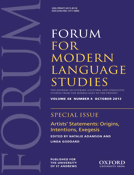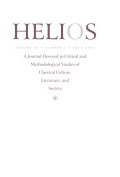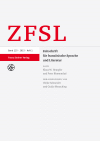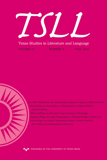
TIJDSCHRIFT VOOR NEDERLANDSE TAAL-EN LETTERKUNDE
Scope & Guideline
Empowering Academic Voices in Dutch Language and Literature
Introduction
Aims and Scopes
- Interdisciplinary Approaches to Dutch Studies:
The journal promotes research that intersects with various disciplines, including linguistics, literature, cultural studies, and history, encouraging a comprehensive understanding of the Dutch language and its literary heritage. - Exploration of Literary and Cultural Heritage:
It emphasizes the importance of exploring the historical dimensions of Dutch literature, including examinations of classic texts, literary movements, and the evolution of language in cultural contexts. - Focus on Multilingualism and Language Contact:
The journal addresses themes of multilingualism, language contact, and the implications of these phenomena on Dutch language development and literature, reflecting the complex linguistic landscape of the Netherlands. - Contemporary Issues in Literature Education:
There is a consistent focus on the relevance of literature education, particularly the integration of digital literature and contemporary texts into educational frameworks, highlighting the evolving nature of literary engagement. - Critical Examination of Literary Quality:
The journal engages with debates surrounding literary quality, offering critical perspectives on how literature can be evaluated and understood within different contexts.
Trending and Emerging
- Digital Literature and Education:
There is a rising focus on the role of digital literature in education, exploring how new media can enhance literary engagement and learning, particularly in the context of contemporary students. - Ecofeminism in Literary Studies:
Recent publications indicate a growing interest in ecofeminism, as scholars examine the intersections between ecological themes and feminist perspectives within Dutch literature, highlighting the relevance of environmental issues. - Multilingualism and Cultural Identity:
The exploration of multilingualism as a reflection of cultural identity is gaining traction, with an emphasis on how language diversity shapes literary expression and societal narratives in the Netherlands. - Postcolonial Perspectives:
There is an increasing trend toward postcolonial analysis within Dutch literature, with scholars reflecting on colonial legacies and their impact on contemporary literary discourse. - Literary Prizes and Cultural Value:
The examination of literary prizes and their role in shaping cultural value and recognition within the literary landscape has emerged as a significant theme, prompting discussions on the criteria and implications of literary awards.
Declining or Waning
- Traditional Historical Literary Analysis:
There appears to be a decrease in publications focused solely on traditional historical literary analysis, as scholars increasingly seek interdisciplinary approaches that incorporate contemporary issues and methodologies. - Minimalist Approaches to Literary Criticism:
Previous trends in minimalist or overly simplistic approaches to literary criticism have diminished, as researchers favor more nuanced and complex analyses that consider broader cultural and social contexts. - Narrowly Defined Linguistic Studies:
Research focusing on narrowly defined or prescriptive linguistic studies has declined, with a growing preference for explorations that consider sociolinguistic and pragmatic dimensions of language use.
Similar Journals

Vestnik Sankt-Peterburgskogo Universiteta-Yazyk i Literatura
Advancing Scholarly Dialogue in Linguistics and Literary TheoryVestnik Sankt-Peterburgskogo Universiteta-Yazyk i Literatura, published by ST PETERSBURG UNIV PRESS, stands as a pivotal academic journal in the fields of linguistics and literature, reflecting a profound commitment to the exploration of language and literary theory. With an ISSN of 2541-9358, this journal has steadily built its reputation since its inception in 2017, achieving impressive rankings in Scopus that place it within the top tiers of its categories—Q2 in Linguistics and Language and Q1 in Literature and Literary Theory as of 2023. The journal serves as an essential platform for researchers, professionals, and students who are keen to delve into the complex interactions between language and literature. Although currently not offering Open Access, its contributions are invaluable to advancing scholarly dialogue and fostering understanding within these vibrant fields. With a converged publication timeline extending through 2024, Vestnik Sankt-Peterburgskogo Universiteta-Yazyk i Literatura exemplifies the ongoing commitment to high-quality research and critical thought, making it an indispensable resource for those dedicated to the study of language and its literary manifestations.

FORUM FOR MODERN LANGUAGE STUDIES
Elevating Research in Literature and LinguisticsFORUM FOR MODERN LANGUAGE STUDIES is a prestigious academic journal published by Oxford University Press that has been serving the fields of literature and linguistics since its inception in 1965. This journal, with an ISSN of 0015-8518 and an E-ISSN of 1471-6860, plays a crucial role in advancing scholarly discourse on modern language studies, including literature and literary theory. With an impactful presence in both the linguistic and literary domains, it has been recognized in 2023 with a category ranking of Q2 in Literature and Literary Theory and Q3 in Linguistics and Language. It stands out in the competitive landscape, holding a notable position within Scopus rankings, including a 70th percentile ranking in Literature & Literary Theory. While the journal currently does not offer open access options, it remains a vital resource for researchers, educators, and students passionate about the transformative power of language and literature. Its commitment to quality research and robust academic discussion underscores its importance, making it a key platform for those aiming to contribute to modern language scholarship.

CLA JOURNAL-COLLEGE LANGUAGE ASSOCIATION
Fostering Dialogue Across Language and Education Disciplines.CLA Journal - College Language Association is a prominent academic journal dedicated to the exploration of language, literature, and education. Published by the College Language Association in the United States, this journal serves as an essential platform for researchers, educators, and students interested in the evolving landscape of language studies. With its coverage spanning from 2002 to 2020, CLA Journal has made significant contributions to the fields of Education, Linguistics, and Literature and Literary Theory, although its indexing in Scopus has been discontinued. The journal is categorized in the Q4 quartile for education and linguistics, indicating a niche but vital role in the academic community, while also achieving a Q3 ranking in literature. The journal occupies an essential space for those engaged in scholarly discourse, offering insightful perspectives and fostering dialogue across these interconnected areas of study.

Bulgarski Ezik i Literatura-Bulgarian Language and Literature
Delving into the Heart of Bulgaria's Linguistic and Literary TraditionsBulgarski Ezik i Literatura - Bulgarian Language and Literature is a distinguished journal dedicated to the exploration and analysis of the Bulgarian language and its rich literary heritage. Published by NATSIONALNO IZDATELSTVO AZ BUKI, this journal serves as a vital platform for scholars, researchers, and students interested in the linguistic and literary dimensions of Bulgaria. While specific impact factors and HIndex metrics are currently not listed, the journal is recognized for its scholarly contributions to the field, making it an invaluable resource for those aiming to advance their understanding of Bulgarian linguistics and literature. The journal is not listed as Open Access, reflecting a traditional publishing model that reinforces the academic rigor of its curated content. Located in Sofia, Bulgaria, at BUL TSARIGRADSKO SHOSE, 125, BL 5, SOFIA 1113, the journal invites contributions that engage with a wide scope of themes related to Bulgarian linguistic and literary studies, thus promoting cultural appreciation and academic discourse within this vibrant area of scholarship.

HELIOS
Exploring the Intersections of Classics and Culture.HELIOS is a distinguished academic journal published by TEXAS TECH UNIVERSITY PRESS, focusing on the fields of Classics, Cultural Studies, Linguistics and Language, and Literature and Literary Theory. Since its inception in 1984, the journal has served as a platform for scholarly discourse, publishing innovative research that intersects various humanistic disciplines. With a Q3 ranking in Classics and Literature and Literary Theory, as well as a Q4 ranking in Cultural Studies and Linguistics and Language, HELIOS demonstrates its commitment to advancing academic inquiry and knowledge dissemination. Although it is not an open-access publication, HELIOS remains a vital resource for researchers, professionals, and students seeking to explore and contribute to the evolving landscape of the humanities. The journal is based in the United States, with its administrative office located at 2903 Fourth Street, Suite 201, Box 41037, Lubbock, TX 79409-1037, making it an integral part of the scholarly community.

Archivum
Illuminating Contemporary Discussions in Language and LiteratureArchivum, published by UNIV OVIEDO in Spain, stands as a vital resource in the fields of Linguistics and Language as well as Literature and Literary Theory. With an impact factor reflective of its commitment to scholarly excellence, this journal has proudly maintained an Open Access model since 1951, ensuring that its rich repository of knowledge is freely available to researchers, professionals, and students alike. Covering a converged span from 2019 to 2023, Archivum has strategically positioned itself within the academic milieu, currently categorized in the Q4 for Linguistics and Language and Q3 for Literature and Literary Theory as of 2023. The journal is indexed in Scopus, with rankings that reflect its growing influence, such as #690 in Literature and Literary Theory and #887 in Language and Linguistics. Despite its challenges in visibility, Archivum remains essential for those seeking to engage with contemporary discussions and research within the humanities. Located in the heart of Asturias, it embodies the scholarly spirit of Spain, fostering a collaborative environment for innovation and inquiry in linguistic and literary studies.

ZEITSCHRIFT FUR FRANZOSISCHE SPRACHE UND LITERATUR
Pioneering Research in the Heart of French LinguisticsZEITSCHRIFT FUR FRANZOSISCHE SPRACHE UND LITERATUR, published by FRANZ STEINER VERLAG GMBH, serves as a notable platform for scholarly discourse in the fields of French language and literature. With an ISSN of 0044-2747 and an E-ISSN of 2366-2425, this German journal has established itself as a respected source for researchers, educators, and students alike who seek to deepen their understanding of linguistic and literary theory. Although it currently does not offer Open Access, its rigorous peer-reviewed articles contribute significantly to the discourse of the humanities. Despite its current Q4 ranking in Linguistics and Language, as well as in Literature and Literary Theory, the journal continues to strive towards enriching the academic landscape, encouraging innovative research and interdisciplinary approaches. With a history of converging from 1987, and recent publications making strides from 2018 to 2022, this journal appeals to those interested in exploring the nuances and complexities of French literature and linguistics, making it a valuable resource for advancing knowledge in these fields.

Lingua Montenegrina
Advancing Understanding of Montenegrin Identity Through ScholarshipLingua Montenegrina is a distinguished academic journal dedicated to exploring and advancing the fields of Montenegrin language and literature. Published by the Institute of Montenegrin Language and Literature, this journal serves as a vital platform for researchers, educators, and students interested in the nuances and development of Montenegrin linguistics, literature, and cultural studies. With an ISSN of 1800-7007, it contributes significantly to the scholarly discourse in the region and beyond. While the journal operates under a traditional subscription model, it ensures that its readership has access to high-quality research that is pivotal for understanding Montenegrin identity and cultural expressions. The commitment of Lingua Montenegrina to rigorous academic standards and its focus on regional studies positions it as an essential resource for those looking to deepen their understanding of the Montenegrin language and its literary heritage.

Listy Filologicke
Advancing Scholarly Discourse in the Heart of the Czech Republic.Listy Filologicke is a distinguished academic journal published by the Institute of Classical Studies at the Academy of Sciences of the Czech Republic, focusing on the interdisciplinary fields of History, Linguistics and Language, and Literature and Literary Theory. With an ISSN of 0024-4457 and an E-ISSN of 2570-9410, this journal has been a pivotal platform for scholarly discourse since its convergence years began in 2003. Notably, it holds a Q3 classification in History and Linguistics and Language, and a Q2 in Literature and Literary Theory as of 2023. Its rankings within Scopus illustrate its relevance and impact in academia, with noteworthy positions in the Arts and Humanities and Social Sciences categories. Researchers, professionals, and students will find Listy Filologicke an invaluable resource for exploring cutting-edge research, critical analyses, and discourse that contribute significantly to their respective fields. Based in the heart of the Czech Republic, it continues to promote scholarly excellence and foster international collaboration.

TEXAS STUDIES IN LITERATURE AND LANGUAGE
Fostering Dialogue in Texas Literature and LinguisticsTEXAS STUDIES IN LITERATURE AND LANGUAGE, published by University of Texas Press, is a distinguished scholarly journal dedicated to the exploration of the rich tapestry of literature and language from Texas and its encompassing regions. With its ISSN 0040-4691 and E-ISSN 1534-7303, this journal serves as a vital platform for researchers, educators, and students interested in the intersection of cultural studies, literary analysis, and linguistic inquiry. Despite the absence of Open Access, the journal remains an essential resource for those seeking rigorous academic discourse within the humanities. The journal, established in 1974, has published influential articles that contribute to a deeper understanding of Texas's unique literary heritage, making it a beacon of scholarship in American literature. The impact factor reflects its relevance and engagement in ongoing literary dialogues. We invite scholars and students alike to engage with the rich content provided, ensuring that Texas's literary legacy continues to be studied and celebrated.